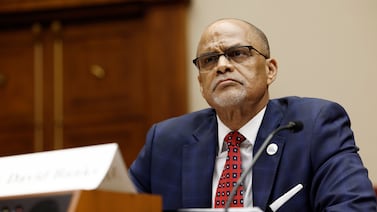A leader of the panel exploring whether Tennessee can reject federal education funding says he doesn’t expect the state to do so, even if it can find a way.
Sen. Jon Lundberg, who co-chairs the special legislative committee looking into the idea, said that based on what the panel has learned during two weeks of hearings that ended on Wednesday, it would be premature to make big changes in the funding streams for Tennessee students.
The Bristol Republican also expects the panel’s work to continue “well into 2024″ as members seek information from the U.S. Department of Education about rules and regulations tied to acceptance of federal funding.
“My expectation is that we’re not going to say no to federal funds. We’re not going to kick more than a billion dollars back to the U.S. government,” Lundberg told Chalkbeat on Thursday.
“But I do think that, as a legislative body, we are going to be more judicious in reviewing federal rules and proposals that are passed on to the state education department and state Board of Education,” he said.
Advocate for education equity: ‘We’re taking this seriously’
This month’s hearings by the GOP-led legislative group mark the furthest any state has gone toward forgoing U.S. education dollars, which typically make up about a tenth of a state’s spending on K-12 education.
The 10-member committee, created by speakers of the House and Senate, has a Jan. 9 deadline to submit its findings and recommendations to the Republican-controlled General Assembly.
House Speaker Cameron Sexton, who touted the idea in February, has said the state wants more autonomy over how its students are taught. He said the state would fill the federal funding gap with state money and continue programs that are currently federally funded.
Most of the federal money received in Tennessee — estimated at about $1.3 billion annually by state education department officials this week — provides additional support to low-income students, English language learners, and students with disabilities. Other federally funded programs target certain needs ranging from rural education to technology to charter schools.
The opt-out talk has angered many Tennesseans who pay federal taxes and whose children benefit from federally funded programs or receive civil rights protections through federal oversight. Advocates of historically underserved students are prepared to mobilize if the committee’s work generates legislation to reject any part of federal funding.
For now, they’re monitoring the panel’s work.
“We’re taking this seriously, because this would be such a consequential step for the state to take,” said Gini Pupo-Walker, who leads The Education Trust in Tennessee. “We’re trying to ensure lawmakers are getting accurate information during the discussions.” (Related: What it would mean for kids)
Tennessee-based advocacy groups such as The Education Trust and the Tennessee Disability Coalition, as well as those representing parents and educators, were not invited or allowed to testify during the hearings — a decision that Lundberg said was designed to keep the committee on mission. Instead, the testimony came mostly from state and nonpartisan researchers, officials with the Tennessee education department, four local school district leaders, and a federal policy expert with the National Conference of State Legislatures.
“Our charge was not to look at how to cut funding, but how to change that funding stream from federal to state dollars,” Lundberg said.
Panel leaders expect to gather more input
As of Wednesday, the U.S. Department of Education had not received questions from the Tennessee panel but stands ready to provide “technical assistance” as needed, a spokesperson said.
The federal department, which was listed on the agenda for one meeting last week, did not send representatives to testify because the agency never received an invitation, the spokesperson said.
Lundberg, who initially told the committee that federal officials were “unable to attend,” clarified on Thursday that the no-show was due to a “miscommunication.”
But he expects the panel will have numerous questions for federal officials, and that the back-and-forth process could take months.
Eventually, the committee may also seek legal opinions from the state attorney general’s office. Because no state has rejected federal education money before, Tennessee officials expect numerous challenges in court if the state takes a step in that direction.
“I notified the speakers that we potentially won’t complete our work by the Jan. 9 deadline,” Lundberg said. “We have to get this right, not just quick.”
Rep. Debra Moody, the Covington Republican who co-chairs the panel, said in a statement that her intention is to “continue gathering pertinent information so the working group can release a complete and competent report.”
Lt. Gov. Randy McNally said he’s pleased the panel is taking its fact-finding mission seriously.
“I have no issue with an extension, if needed, and I look forward to reading the group’s final report when it is completed,” McNally said through a spokesman.
As part of their fact-finding mission, there’s no discussion of committee members touring the state to see the kinds of services provided under federally funded programs to determine whether the state has sustainable finances and operational capacity to continue them.
For instance, federal money helps support homeless students, career and technical education labs, and after-school programs that provide tutoring, enrichment, and meals to students from low-income families.
Pupo-Walker, from The Education Trust, said any comprehensive investigation should include that type of research.
“I think it would be a disservice,” she said, “not to see firsthand how those federal dollars play out in the lives of children and families and schools and their communities.”
You can see a state analysis of county-by-county budget information that includes public education, at the General Assembly’s website. The nonpartisan Sycamore Institute has also produced two recent reports about federal education funding in Tennessee.
Marta Aldrich is a senior correspondent and covers the statehouse for Chalkbeat Tennessee. Contact Marta at maldrich@chalkbeat.org.






